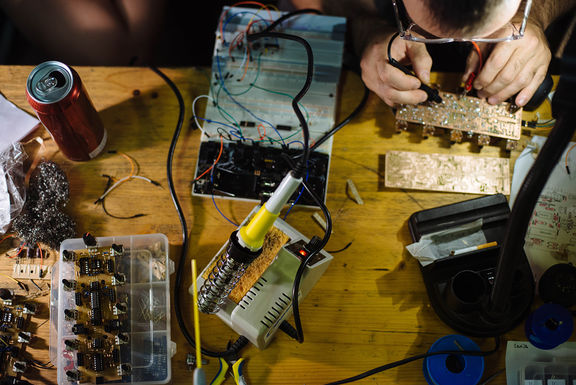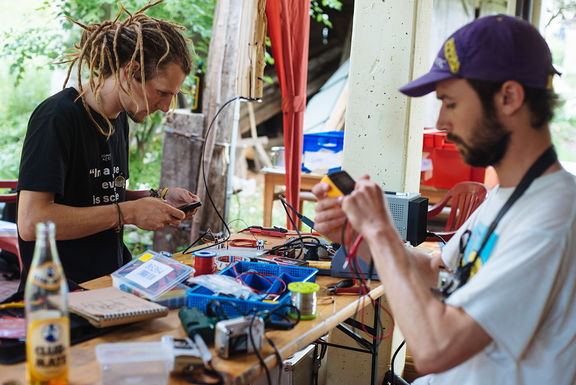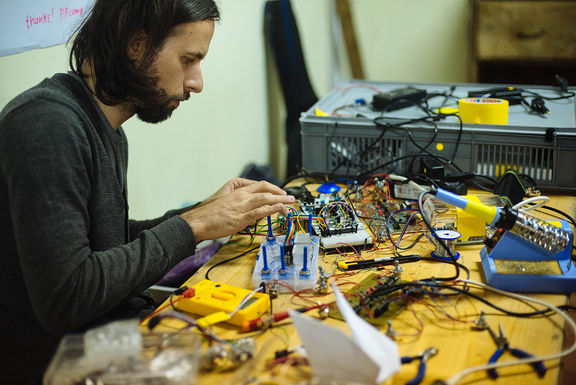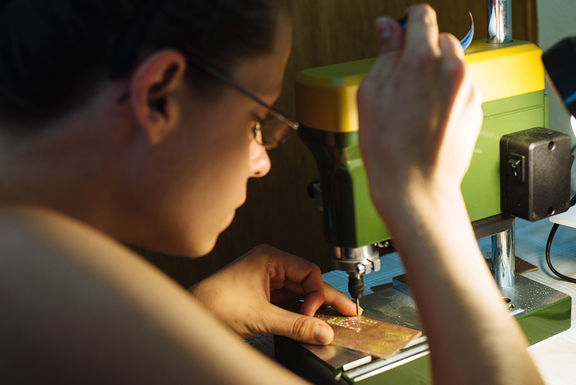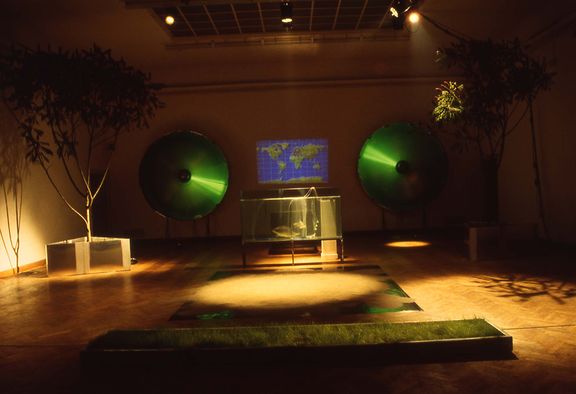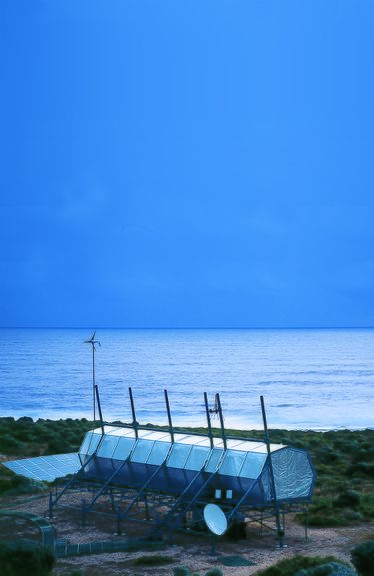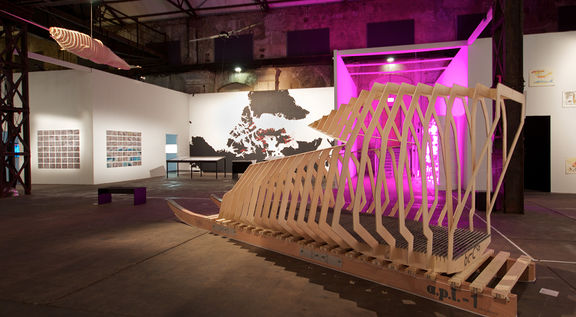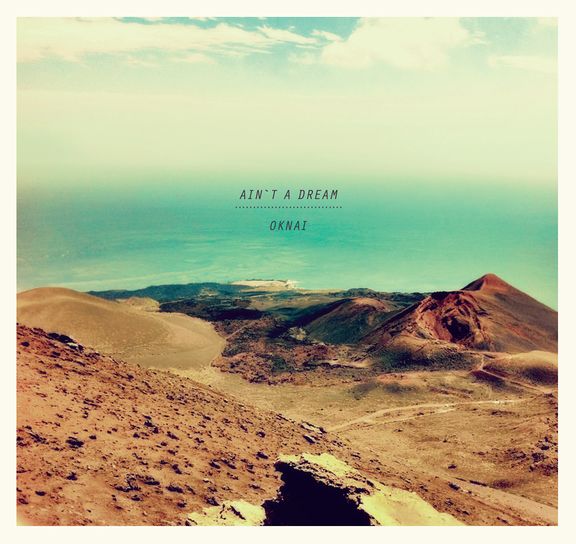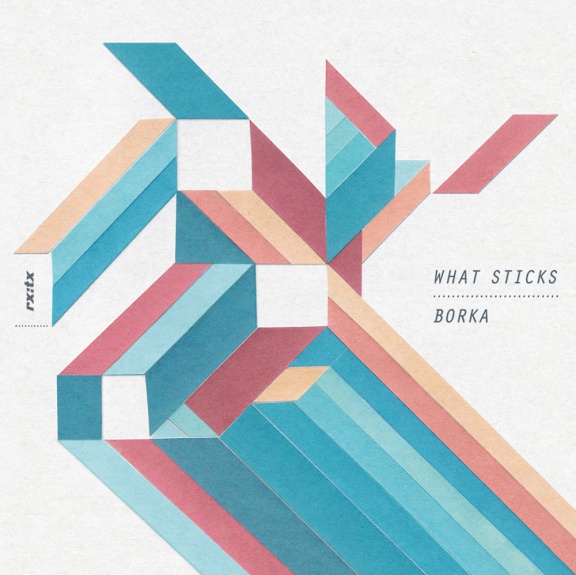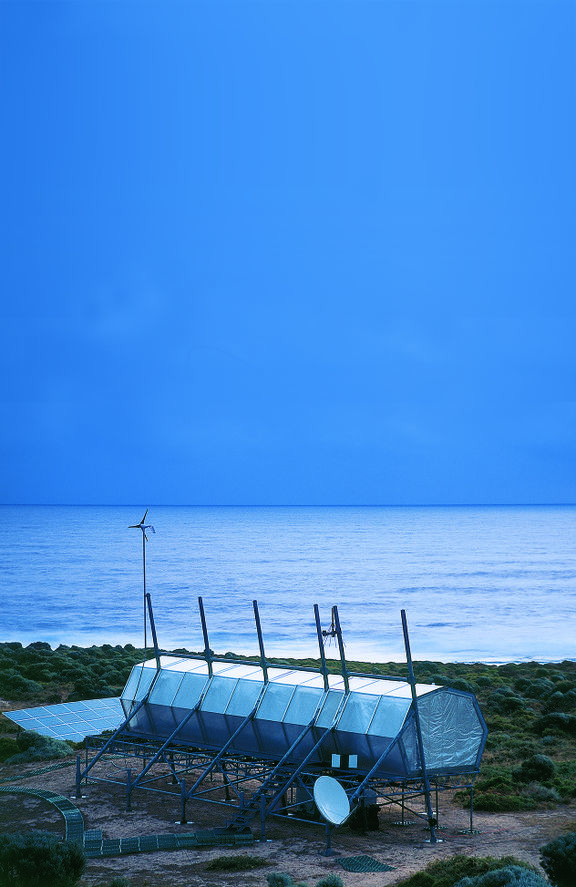Projekt Atol Institute
-
to
24 Jan 2020
2 Feb 2020
GermanyBerlinMONOMLost Space: Oceans by Robertina Šebjanič and William Russell with musical contributions from FLORA (Jonas V. Ronnberg, Anna Melina) and additional sound sculpting by Tillman Jex at the Sonic Cinema Platform, supported by the Projekt Atol Institute, -
to
5 Sep 2019
9 Sep 2019
AustriaLinzGallery SpaceMaja Smrekar's exhibition Survival Kit for the Anthropocene - Trailer, produced by Aksioma Institute, in the frame of the exhibition Postnature. The Future is Present; Star Valley by Marko Peljhan (Projekt Atol Institute, attending several panels) and Matthew Biederman; and the project Aurelia 1+Hz / proto viva generator 2.0 by Robertina Šebjanič, also attending the panel Paradoxes and Obstacles in Maintaining and Staging Alive Biomedia Art, At the Ars Electronica Festival Linz -
to
11 May 2019
24 Nov 2019
ItalyVeniceArsenaleA project by Marko Peljhan (Projekt Atol Institute), curated by Igor Španjol, produced by Moderna galerija / Museum of Modern Art, Ljubljana plus Museum of Contemporary Art Metelkova, and supported by the Ministry of Culture At the La Biennale di Venezia International Art Exhibition -
to
23 Mar 2019
5 May 2019
GermanyRostockRostock Art GalleryThe interactive sound installation Time Displacement: Chemobrionic Garden by Robertina Šebjanič, Aleš Hieng – Zeron and Ida Hiršenfelder (Projekt Atol Institute, Ljudmila Art and Science Laboratory) -
to
16 Nov 2018
25 Jan 2019
CroatiaRijekaMuseum of Modern and Contemporary ArtReading Stanley Brown by Tao Vrhovec Sambolec, co-produced by Projekt Atol Institute and Sploh Institute, featured at a group exhibition Escape, -
to
5 May 2018
29 Jun 2018
AustriaGraz/GradecEsc medien kunst laborDark Drops by Robertina Šebjanič and Time Displacement / Chemobrionic Garden by Robertina Šebjanič, Aleš Hieng - Zergon, and Ida Hiršenfelder (Projekt Atol Institute, Ljudmila Art and Science Laboratory), -
to
7 Sep 2017
11 Sep 2017
AustriaLinzArs Electronica Center, Moviemento Movie, PostCityAI – The Other I, a symposium moderated also by Jurij Krpan (Kapelica Gallery), POINT ZERO – Human.0, Machine.0, Data.0, a group exhibition featuring Until I die by [[::vtol::]], a screening of Nighthawk by Špela Čadež, produced by Finta and supported by the Slovenian Film Centre, We Should Take Nothing for Granted! Listening Conditions for an Alert and Knowledgeable Citizenry by Matthew Biederman and Marko Peljhan and produced by Projekt Atol Institute, and Semiotics of the Laboratory by Špela Petrič, Günter Seyfried, Roland van Dierendonck, Miha Turšič and Slavko Glamočanin At the Ars Electronica Festival Linz -
to
11 May 2017
2 Jul 2017
ItalyVeniceSala del Camino - Campo S. CosmoYou Gotta Say Yes to Another Access, an exhibition featuring a work from the collection Rhythms of Presence by Tao G. Vrhovec Sambolec, co-produced by Projekt Atol Institute and Sploh Institute, -
to
6 May 2017
13 May 2017
ItalyVeniceThetis GardenCommand-Alternative-Escape, an exhibition featuring a work from the collection Rhythms of Presence by Tao G. Vrhovec Sambolec, co-produced by Projekt Atol Institute and Sploh Institute, -
to
1 Feb 2017
5 Feb 2017
GermanyBerlinSpektrum, Werkstatt BerlinAn audio-video performance and workshops by the Theremidi Orchestra, produced by Ljudmila Art and Science Laboratory and Projekt Atol Institute in cooperation with Werkstatt ThoughtWorks Berlin and SPEKTRUM and organised in cooperation with the Slovenian Cultural Centre in Berlin and the Embassy of the Republic of Slovenia in Berlin, -
to
8 Sep 2016
18 Sep 2016
AustriaLinzOK im OÖ KulturquartierAurelia 1+Hz / proto viva generator by Robertina Šebjanič and Slavko Glamičanin at the CyberArts exhibition, Time Displacement / Chemobrionic Garden by Robertina Šebjanič, Aleš Hieng and Ida Hiršenfelder (Projekt Atol Institute, Ljudmila Art and Science Laboratory), Miserable Machines: Soot-o-mat by Špela Petrič, and Anatomy of Frozen Genesis by Dean Verzel -
to
1 Sep 2016
21 Sep 2016
NorwayBergenBergen Public Library, Lydgalleriet, Rom8 Project SpaceRhythms of Presence, a solo exhibition by Tao G. Vrhovec Sambolec, co-produced by Projekt Atol Institute and Sploh Institute, -
to
23 Aug 2016
28 Aug 2016
PolandToruńTheatre "Baj Pomorski"Light Oscilator by Tilen Sepič (Strip Core/Forum Ljubljana) at the Bella Skyway Festival, co-organised the Ljudmila Art and Science Laboratory and Projekt Atol Institute, -
to
14 Jul 2016
24 Oct 2016
LebanonBeirutSursock MuseumSystem 67 – Immaterial, an acoustic-spatial installation by Marko Peljhan, at the exhibition Let’s Talk about the Weather: Art and Ecology in a Time of Crisis, co-produced by Projekt Atol Institute, -
to
11 Sep 2015
13 Sep 2015
PortugalCascaisGaleria da Marina, Jardim da Igreja Paroquial, Pavilhão MultiusosProjects In parallel by Natalija Črncec and Nina Šulin, Soundlighter by Izland (Gašper Milkovič Biloslav and Marko Vivoda) and jesusonecstasy aka Mitja Cerkvenik (Ljudmila Art and Science Laboratory and Projekt Atol Institute), and the workshop Clouds by Tilen Sepič (Strip Core / Forum Ljubljana) at the festival Lumina -
2 Nov 2014
TurkeyIstanbulGalata Greek Primary SchoolDesigners in Dialogue:The Future is?, a discussion also featuring Arctic Perspective Initiative (Projekt Atol Institute), at the 2nd Istanbul Design Biennial -
to
22 Oct 2014
4 Jan 2015
CanadaMontrealMusee d'Art ContemporainThe collection of works Arctic Perspective Initiative (Projekt Atol Institute) at La Biennale de Montréal -
to
26 Sep 2014
9 Nov 2014
USAPittsburghSpaceWe Should Take Nothing for Granted, an audio-visual installation and performance set of works by Aljoša Abrahamsberg, Matthew Biederman, Brian Springer, and Marko Peljhan (Projekt Atol Institute), at the Pittsburgh Biennial 2014 -
to
10 Sep 2014
15 Sep 2014
USANew YorkEyebeamSound Happens in the Group, a workshop by Theremidi Orchestra (Ljudmila - Ljubljana Digital Media Lab and Projekt Atol Institute) -
to
19 Jul 2014
28 Sep 2014
JapanSapporoSapporo Ekimae-dori Underground Walkway (Chi-Ka-Ho)Arctic Perspective Initiative by Marko Peljhan (Projekt Atol Institute) and Matthew Biedermann at the Sapporo International Art Festival -
to
15 May 2014
3 Aug 2014
LatviaRigaLatvian National Arts MuseumHu.M.C.C. m.k.2 (Human Molecular Colonization Capacity) by Maja Smrekar, Wheat and Rope by OHO, and We should take nothing for granted by Marko Peljhan, Aljoša Abrahamsberg, Brian Springer, and Matthew Biederman (Projekt Atol Institute), at the FIELDS Exhibition and Art+Communication Festival -
to
6 Feb 2014
23 Feb 2014
JapanTokyoTokyo Metropolitan Museum of PhotographyMarko Peljhan (Projekt Atol Institute) and Matthew Biederman present ᐃᐱᒃᑐᖅ (Ipiktuq): Augmented senses across sea, tundra and ice (Arctic Perspective Initiative) at the Yebizo Festival -
to
12 Dec 2013
15 Feb 2014
RussiaMoscowLABORATORIA Art&Science SpaceArctic Perspective Initiative by Marko Peljhan (Projekt Atol Institute) and Matthew Biedermann (workshops and discussions 13,14 Dec) at the Ice Laboratory exhibition at the 5th Moscow Biennial of Contemporary Art -
to
11 Oct 2013
15 Nov 2013
SerbiaBelgradeZepter ExpoJože Barši, Jasmina Cibic and a project Arctic Perspective Initiative: Sea, Tundra and Ice Papers by Marko Peljhan and Matthew Biederman (Projekt Atol Institute) at the 54th October Salon -
6 Aug 2013
MexicoMexico CityLaboratorio Arte AlamedaMarko Peljhan's (Projekt Atol Institute) keynote talk At the Kosmica Festival -
to
3 Aug 2013
13 Oct 2013
USALancastreMuseum of Art and History (MOAH)Free Enterprise: The Art of Citizen Space Exploration, a joint exhibition co-curated by Marko Peljhan, featuring also Slovene artists and organisations Cultural Centre of European Space Technologies (KSEVT), Trieste Constructivist Cabinet, Nejc Trošt, Noordung Cosmokinetic Cabinet, Projekt Atol Institute -
to
17 Jul 2013
30 Jul 2013
USANew YorkWave FarmSpektr collective (Projekt Atol Institute), participants: Aljoša Abrahamsberg, Matthew Biederman, Marko Peljhan, Brian Springer), artists-in-residence working on transmission arts, public presentations -
23 Mar 2013
BelgiumBrusselsResilients - Hotel Resileints project presentation, Uroš Veber, (Projekt Atol Institute) -
to
19 Jan 2013
18 May 2013
USARiverside (CA)California Museum of Photography, Culver Center of the Arts & Sweeney Art GalleryFree Enterprise: The Art of Citizen Space Exploration, a joint exhibition also featuring Slovene artists and organisations: Cultural Centre of European Space Technologies (KSEVT), Trieste Constructivist Cabinet, Nejc Trošt, Noordung Cosmokinetic Cabinet, Projekt Atol Institute, and curated by Marko Peljhan -
to
9 Jun 2012
16 Sep 2012
GermanyKasselBali KinoA screening of the film The Radiant by the Otolith Group and co-produced by the Projekt Atol Institute during dOCUMENTA (13) -
to
10 May 2012
25 Jun 2012
NetherlandsAmsterdamThe Netherlands Media Art InstituteThe Source - Virtual Hole Sun 1:1, an exhibition by Tao G. Vrhovec Sambolec, co-produced by Projekt Atol Institute and Kapelica Gallery -
to
15 Sep 2011
31 Dec 2011
FranceLyonThe Arctic Perspective Initiative in La Sucrière at the Biennale de Lyon -
to
27 May 2011
30 Oct 2011
Bosnia and HerzegovinaKonjicD-0 ARK Underground1st TIME MACHINE Biennial of Contemporary Art with the participation of Marko Peljhan and Tobias Putrih -
8 Dec 2010
USANew YorkTishman Auditorium - The New SchoolMarko Peljhan, Projekt Atol Institute participates at the Confounding Expectations: Images, Surveillance and Power conference organised by The Aperture Foundation, the photography department in the School of Art, Media and Technology and the Vera List Center for Art and Politics at 7pm -
to
3 Dec 2010
16 Jan 2011
SerbiaBelgradeSalon of Museum of Contemporary ArtTerritory 1995 installation by Marko Peljhan -
to
13 Nov 2010
6 Feb 2011
JapanYamaguchiYamaguchi Center for Arts and Media (YCAM)Polar m [mirrored] installation by Projekt Atol Institute by Carsten Nicolai and Marko Peljhan -
to
23 Sep 2010
11 Jan 2011
USANew YorkMarko Peljhan (Projekt Atol Institute) participates in Serbia, frequently asked questions, an exhibition organised by the Museum of Contemporary Art Belgrade (EUNIC project) at the Austrian Cultural Forum New York -
to
18 Jun 2010
10 Oct 2010
GermanyDortmundPhoenix HalleArctic Perspective exhibition by Projekt Atol Institute with Hartware MedienKunstVerein (HMKV)
- Green Revisited: Encountering Emerging Naturecultures (GREEN), 2019
Project summary - Feral Labs Network, 2018
Project summary - Changing Weathers, 2014
Project summary - Resilients, 2011
Project summary - Arctic Perspective – Third Culture 2008-2010, 2008
Project summary - IMMEDIATE - Immersive Media Dance Integrating in Telematic Environments, 2007
Project summary - Waves – electromagnetic waves as material and medium of art, 2006
Project summary - Crash Test Dummy: The New European Self in a Bio-political Crash Test, 2005
Project summary - MIR – Microgravity Interdisciplinary Research, 2002
Project summary Show more
Projects
As of 2012, Projekt Atol Institute runs a joint programme of regular artists residencies, workshops and new media art projects together with the Ljudmila Art and Science Laboratory. Since 2015, Projekt Atol and Ljudmila have been also responsible for the week-long 'hack-camp', called PIFcamp.
In 2018 Projekt Atol Institute initiated the Feral Labs Network, in partnership with Makery/Digital Art International (FR), Catch/Helsingør Kommune (DK), SCHMIEDE HALLEIN – Verein zur Förderung der digitalen Kultur (AT), Bioart Society (FI) and Radiona (HR). The programme is co-funded by the EU Creative Europe Programme.
Makrolab
Projekt Atol is probably best known for its Makrolab project which in the period 1994–2007 grew into a complex set of technological, political and environmental activities and researches. The project has won its initiator, Marko Peljhan, a UNESCO Digital Media Prize in 2004 and a Prešeren Foundation Award in 2007, and has been recognized in worldwide media art textbooks and survey literature.
In 1994 the project Makrolab was developed as an ongoing mobile laboratory set-up for open and integral research and the common work of artists, scientists, and tactical media workers in the fields of telecommunications, migrations research, weather and climate. First set up in 1997 during the documenta X exhibition in Kassel, Germany, it subsequently operated in Western Australia (Rottnest Island), Slovenia (Veliki Kras), in the Scottish Highlands (Atholl Estates) on the island of Campalto (Isola di Campalto), and (as part of the 2003 Biennale di Venezia art exhibition and the TEMPUS PHARE CBC Interreg IIIA programme) in the Venice Lagoon.
During 2007–08, the International Polar Year, the Makrolab project produced installations in Antarctica and Nunavut. This mission involved a conceptual and practical linkage of both polar regions. In this transnational spirit, Makrolab was managed by I-TASC, the Interpolar Transnational Ars Science Constellation.
Arctic Perspective Initative
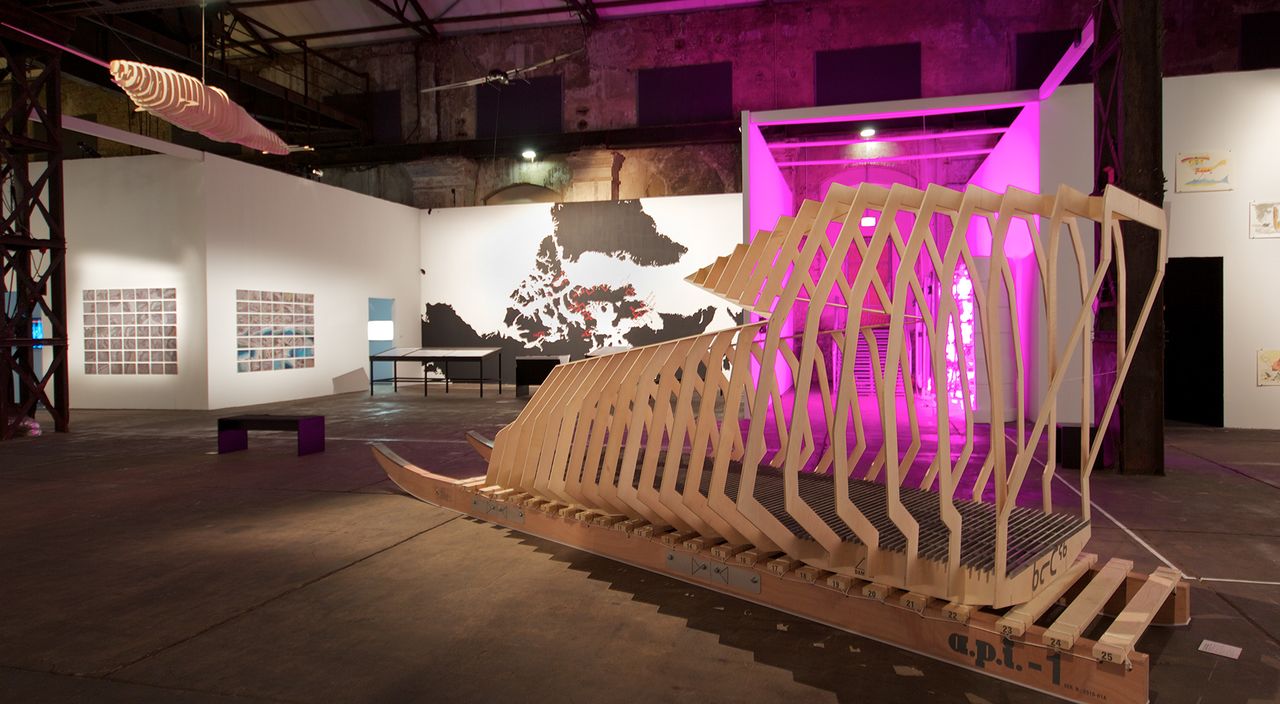 Arctic Perspective exhibition by Projekt Atol Institute at the Phoenix Halle, Mainz, June-October 2010
Arctic Perspective exhibition by Projekt Atol Institute at the Phoenix Halle, Mainz, June-October 2010
Following Makrolab and a direct descendant of I-TASC, the Arctic Perspective Initiative is another long term project, one of the main focuses of the Projekt Atol’s recent work. It focuses on the empowerment of the Arctic people through open source technologies and applied education and training, but also serves as one of the focusing points for promotion of contemporary art and science of the circumpolar region on the "global south". The project is aimed to last at least 10 years and is based on various themes, such as traditional and contemporary conceptual art practices, architecture, geopolitics, autonomy and technology. Hatje Cantz Verlag has already published two Arctic Perspective Cahiers and two more are about to follow in 2011. A renowned Argentinian curator Victoria Noorthoorn listed the Arctic Perspective exhibition among the top ten in 2010 in the December issue of the Art Forum Magazine.
polar (2000) and polarm [mirrored] (2010)
polar (2000), a project by artist Carsten Nicolai and Marko Peljhan, was commissioned by ICC NTT Tokyo and was concerned with the assumption of the global communications networks as an intelligent matrix. The main thesis of the polar was that the human created networks are beginning to mimic indeterminate phenomena as we find them in nature itself. The project won the Golden Nica Prix for Digital Media Arts at the Ars Electronica Festival.
In 2010 the Peljhan and Nicolai project polarm [mirrored] was commissioned by the Yamaguchi Center for Art and Media (YCAM) as a follow-up to the award-winning polar in 2000. While in residency at YCAM, the two artists explored the the earth's radiation and electromagnetic ecosystems in an attempt to understand these phenomena as a method of environmental exploration that is deeply rooted in physical nature. Ten years after the first polar project, technology and measuring devices are even more precise. But what do they bring us closer to?
Other projects
Projekt Atol's other projects in the field of technology and communications research include the Resolution series projects, the Trust-System series projects, the Insular technologies initiative, the Wardenclyffe series projects, the Signal-Sever! series of performances, the Egoritmi-Egorhythms performances, the Ladomir-faktura series of situations, the Slovene Space Agency in Constitution initiative. In addition, Projekt Atol has produced music and sound related projects such as the rx-tx music label and the Re-lax event series.
In 2001, together with the Baterija group of architects, it co-ordinated and lead the production of the mobile media lab Transhub, realised as Mobilatorij for the Mobitel company and managed by Ljudmila, Cyberpipe and Mobitel.
Projekt Atol collaborates with the Yuri Gagarin Cosmonaut Training Centre in Moscow and between 1999 and 2003 co-ordinated seven parabolic flights in microgravity for different artistic projects, the first of these involving the Noordung Cosmokinetic Cabinet (1999); Projekt Atol subsequently produced three other Noordung Cosmokinetic Cabinet performance events prior to 2003 and continued to collaborate with Dragan Živadinov on the Three Elizabethan Tragedies [Tri elizabetinske tragedije] trilogy by the Croatian playwright Vladimir Stojsavljević. The trilogy discusses the relation between theatre and the state in the period of Renaissance through its main protagonists, namely Christopher Marlowe, William Shakespeare and Ben Jonson. The first two parts were co-produced with the Delak Institute - The Forbidden Theatre [Prepovedano gledališče] premièred in 2008 and Marlowe in 2009.
Territory 1995 is a project dealing with the Srebrenica genocide. It was presented at the Istanbul Biennial in 2009 and in 2010 at the group exhibition Serbia - Frequently Asked Questions in New York and at Museum of Contemporary art in Belgrade.
International profile
Productions of Projekt Atol have been presented at the documenta X, the Johannesburg Biennale, the third Manifesta European Biennial of Contemporary Art in Ljubljana (2000), the Gwangju Biennale, ISEA, CanonARTLAB, Ars Electronica, and at other venues around the world, such as P.S.1 MOMA, New Museum of Contemporary Art, ICC NTT Tokyo, and YCAM Yamaguchi.
Projekt Atol Institute regularly participates as a producer or production partner in various performing and new media arts projects. One such project, a recipient of funding from the European Commission's Culture Programme, was entitled IMMEDIATE: Immersive Media Dance Integrating in Telematic Environments. Together with co-organising partners Ciant (CZ), Laboratory for Mixed Realities-LMR (DE), Amber (TR), and A4 (SK), with the participation of artists and researchers from Dardex and Mort2Faim collective (FR), the project sought to develop high-quality creative workshops resulting in mixed-reality choreographic performances.
Projekt Atol Institute is partner to the following initiatives: Arctic Perspective Initiative (API), world-information.org (WIO), the MIR network (Arts Catalyst, Leonardo/Olats, V2, and Multimedia Complex of Actual Arts), Acoustic Space Lab, and AUVSI.
See also
- rx-tx
- Noordung Cosmokinetic Cabinet
- New Media Art Timeline
- PIFcamp
- Ljudmila Art and Science Laboratory
External links
- Projekt Atol Institute website (in Slovenian)
- Ladomir.net peljhan territories archive
- Marko Peljhan on World-Information.Org website
- Marko Peljhan's lecture at The Influencers Festival 2005
- Extensive interview with Marko Peljahn on Makrolab, 2017
Projects
- polarm [mirrored] project website
- Arctic Perspective project
- Projekt Atol on Non Stop Future Public Netbase
Texts
Gallery
- Producers
- New media art
- New media art producers
- Theatre
- Theatre producers
- Music
- Music publishers
- Visual arts
- Visual arts producers
- Exhibition organisers
- Šiška Cultural Quarter
- EU funding of Slovene organisations (Culture and MEDIA Programmes)
- EU Culture funding recipient
- EU Creative Europe, Culture funding recipient
- KONS Platform
- Theatre & Dance
- Music festival and event organisers
- New media art festival and event organisers
- New media art course and workshop organisers


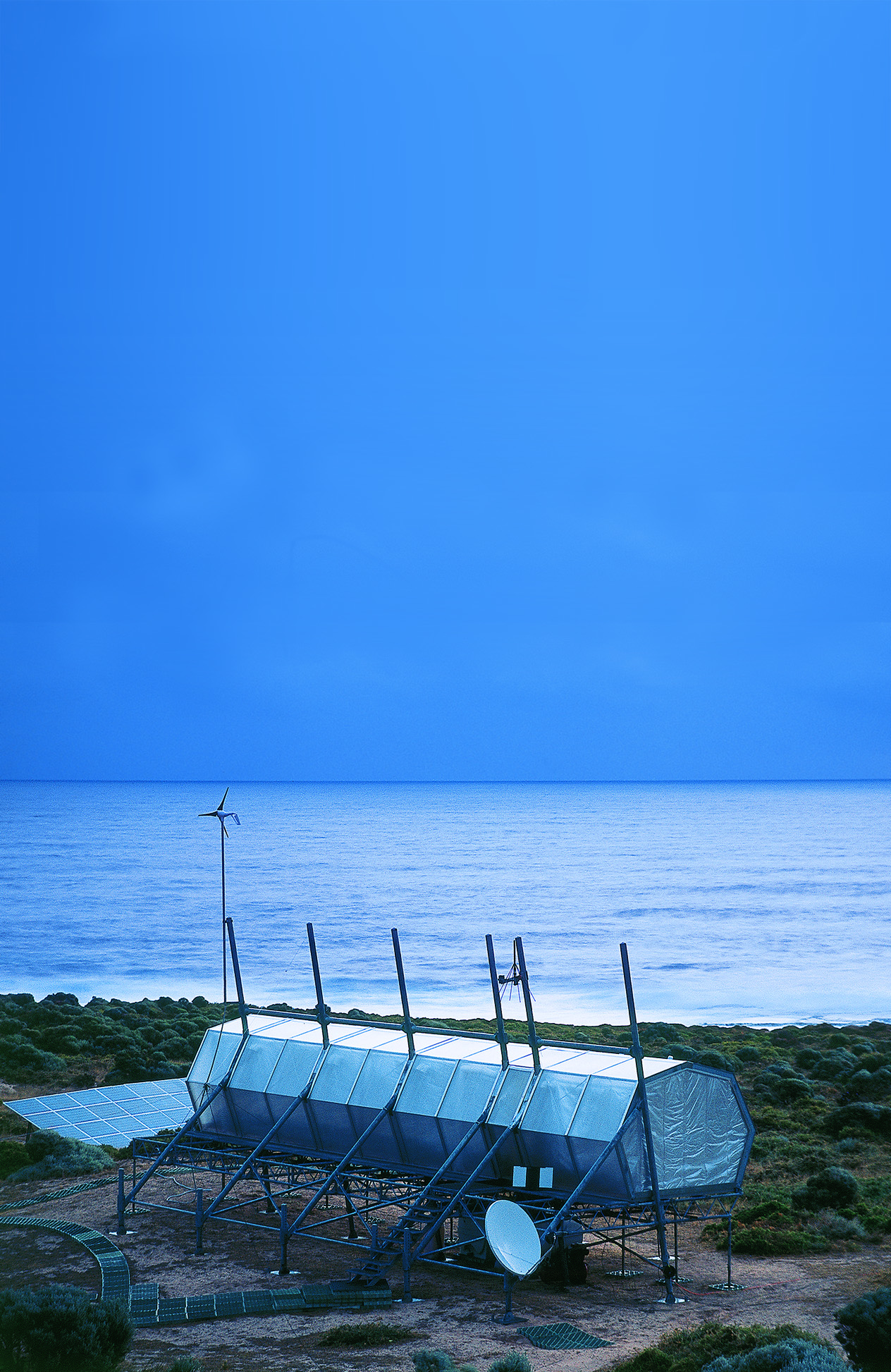
![Nevromat [Neur-O-Matic], an installation by Lenka Đorojević & Matej Stupica that got the OHO Group Award in 2015](/images/thumb/b/b7/Ljudmila_Art_and_Science_Laboratory_2014_Dorojevic_Stupica_Neur-O-Matic_Photo_Miha_Peterlic_%282%29.jpg/576px-Ljudmila_Art_and_Science_Laboratory_2014_Dorojevic_Stupica_Neur-O-Matic_Photo_Miha_Peterlic_%282%29.jpg)
